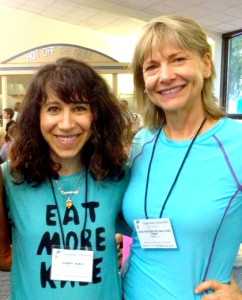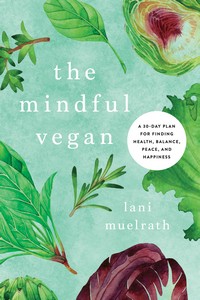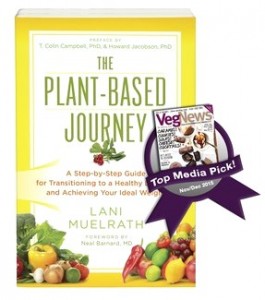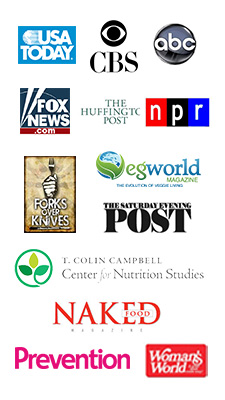I had the great good fortune of meeting up with Sharon and her family earlier this summer at Vegetarian Summerfest in Pennsylvania where she first told me her story. I’m honored to share it with you today.
Prevent Breast Cancer: Shifting the Focus from Treatment to Prevention
by Guest Author Sharon Klupt McRae

Sharon McRae with Lani Muelrath at Vegetarian Summerfest, PA 2013
It’s hard to imagine in the midst of summer’s heat, but Breast Cancer Awareness Month will be here again before we know it. We’ll see pink ribbons everywhere: On cosmetics, kitchen appliances, clothing, buckets of chicken, bagels, frozen pizzas, cartons of yogurt and milk, and bags of potato chips. How many of us can truly say we need this reminder to be “aware” of breast cancer? While many women, if not themselves current or former breast cancer patients, know at least one person who has been affected by this disease, there is still much that many of us do not know about it. For instance, we hear a lot of talk about the breast cancer gene(s), but research shows that the majority of breast cancer cases are not genetically based. I became a certified health coach in large part because I watched my mother receive an early diagnosis, suffer off and on for 26 years, and ultimately succumb to this deadly disease just over four years ago. She tested negative for the genes implicated in breast cancer, and that did give me some peace of mind.
Living in high alert
Shortly after her diagnosis, I began reading as much as I could about breast cancer. I learned that there were some ways in which I could protect myself: Having regular breast exams and mammograms, practicing monthly breast self exams, exercising regularly, breast-feeding when I had children, and avoiding chemicals that were potential carcinogens. I lived in a constant state of high alert all throughout those years, faithfully going for my yearly mammograms and breast exams with my doctor….and constantly checking my breasts in between for the slightest lump or bump. It was truly terrifying; I felt like a ticking time bomb rested in my chest for many years. Though there was no real discussion around weight and diet, I began making modifications to the way I ate. But it wasn’t until years later, after I had my three children and was passing time in the cancer ward at Hopkins while my mother was dying of metastatic breast cancer, that I had my epiphany. I remember standing in the pantry, the small room where food is stored for the patients. I was surrounded by the depressing sight of suffering patients and their distraught relatives, and feeling completely helpless to be amongst them. And at that moment I heard a voice inside my head say, “Stop eating animal protein.” That was it. And I had no idea what it meant, other than that if I listened, it meant I would be the “V word” (vegan). And the thought of eating a vegan diet terrified me…I was already so limited in what I ate, and this would mean giving up some of my favorite foods.
Going plant-exclusive
But after two weeks, I decided that I didn’t miss dairy at all and was ready to “come out” as a vegan. The reaction was hardly a positive one. Everyone, especially my husband and kids, was in a panic. What would I eat? How would it affect them? How could we go to restaurants or to the homes of relatives or friends for dinner? But I reassured them all that I wouldn’t change a thing for them and that I would take care of my dietary preferences myself. However, soon after, in my early conversations with representatives from the nutrition school in which I enrolled for health coach certification, someone recommended that I read the book, The China Study by T. Colin Campbell. That was the book that changed my life. It detailed the very strong connection between casein, the protein found in milk and dairy products, and the promotion of cancer. And I went into a full-blown panic, because my kids, who had been raised vegetarian and had never eaten meat, were eating a lot of dairy. They were 10, 10, and 6 at the time, and I remember sitting them down and telling them they were not going to eat any more cheese, eggs, yogurt or ice cream. They all three cried, real tears. They were terrified. I explained why I was doing this, not to punish them, but to protect them. Not only did we lose my mother to cancer, but my father is also a survivor; he lost his brother and his aunt to cancer, and both of my grandmothers died of cancer, in their early 60’s. My husband’s mother went on to get her own diagnosis of colon cancer a year or two later, and his brother was diagnosed with cancer just last year. The cards were stacked against us, but I was armed with knowledge about how we could protect ourselves, at least in part, and I couldn’t ignore it.
As the years went by, I continued to learn more and more about the importance of food with regard to health and disease prevention. I read the books Eat to Live and Super Immunity by Dr. Joel Fuhrman, and they further refined my vision of what the most protective diet would be. I watched and shared the highly informative and compelling documentary, Forks Over Knives. All of this made me realize that I had to begin including more whole plant foods in order to get the protective benefits of their antioxidants and micronutrients. I learned that nutritional researchers have been publishing scientific studies for more than two decades that demonstrate that eating certain foods, like mushrooms, flaxseed, cruciferous vegetables, whole forms of soy, and green tea, significantly decrease the risk of breast cancer onset or recurrence. Conversely, eating the so-called “Standard American Diet”, including dairy and other saturated fat and especially protein from animal products, as well as highly processed and refined products, significantly increase that risk. Many physicians are not informing their patients of this important research, either because they do not know about it (medical students receive minimal training in nutrition), or because they know about it but don’t believe their patients are likely to change their diets.
Today, my entire household (my husband and I and our three kids) follows a healthy whole food, plant based lifestyle and has been doing so for several years. We all are enjoying better overall health, fewer doctor visits, increased energy and vitality, and the comfort of knowing that every time we pick up a fork or a spoon all of us are dramatically lowering, instead of increasing, the risk of ever contracting cancer (as well as heart disease, diabetes, and many other chronic illnesses that are all too common in our country today). And, I might add, we are all enjoying delicious food! What’s more, my personal interest in this subject has now become a professional pursuit in what I believe to be my life’s calling. I run my own business as a certified health coach specializing in helping other individuals and families transition to the many joys and benefits of a healthy, whole food plant based dietary lifestyle, and I am a certified nutrition and cooking instructor for PCRM’s (Physician’s Committee for Responsible Medicine) Food for Life program.
The prevention connection
Looking back, I feel quite certain that if, just once during my mother’s long battle with breast cancer, a single medical professional would have told her about the research demonstrating the very powerful connection between nutrition and cancer, she would have made some major changes. She would have started eating more vegetables, fruits, legumes and whole grains to increase her fiber intake (fiber carries excess estrogen out of the body), and she would have found substitutes for her favorite frozen yogurt/ice cream desserts and meat dishes, which did not contain animal protein to fuel her cancer. She would have lost the excess weight that was causing her circulating estrogen levels to remain high…and I’m betting she would still be here today. It is for this reason that I am so passionate about spreading the word. We can take control and we must start making changes right away, to protect ourselves and our loved ones from this dreadful disease.
It is this message that I want to share: We are already “aware” of breast cancer. We are aware of how it can rob us of life and of love. And we are tired of being made to feel fearful and vulnerable just because we are women. Armed with the nutritional knowledge that is already abundantly available, we have the power to protect ourselves, not just to wait for the magic and elusive “cure” that we hope will be discovered before we or any of our loved ones receive a diagnosis. We are not helping to prevent breast cancer when we continue to consume products that may well promote breast cancer, like dairy, meats, refined and processed foods, and personal care items laden with carcinogens. If we are going to solve the problem of breast cancer, we must focus on the cause, and not exclusively on treating the disease after it has been diagnosed. If you want to make a difference in the fight against breast cancer, join the fight to PREVENT IT.
About the author:
 Sharon McRae is a plant-based Certified Health Coach residing in Columbia, MD, who has been applying principles of health and nutrition in her own life for more than three decades. She became a health coach to fulfill her passion of helping others feel their best and achieve and maintain optimal health. Sharon is also a certified instructor for the Physician’s Committee for Responsible Medicine’s (PCRM) Food for Life program, teaching nutrition and cooking classes throughout Howard County. As a married mother raising three children in a whole-food, plant-based lifestyle, Sharon is happy to share her practical tips for bringing the benefits of this healthful way of eating and living into any household. Sharon offers nutrition and health coaching to clients and families and conducts special events such as workshops, seminars, and food store tours. This article was originally printed in B Woman Magazine, which can be read at www.bwomanmagazine.com.
Sharon McRae is a plant-based Certified Health Coach residing in Columbia, MD, who has been applying principles of health and nutrition in her own life for more than three decades. She became a health coach to fulfill her passion of helping others feel their best and achieve and maintain optimal health. Sharon is also a certified instructor for the Physician’s Committee for Responsible Medicine’s (PCRM) Food for Life program, teaching nutrition and cooking classes throughout Howard County. As a married mother raising three children in a whole-food, plant-based lifestyle, Sharon is happy to share her practical tips for bringing the benefits of this healthful way of eating and living into any household. Sharon offers nutrition and health coaching to clients and families and conducts special events such as workshops, seminars, and food store tours. This article was originally printed in B Woman Magazine, which can be read at www.bwomanmagazine.com.




What a wonderfully inspiring story! Thank you so much for sharing. As a mother of little ones, your story encourages me to stay strong on the PB path for not only my health, but my famalies health (and the health of future generations!) as well.
D’Ann,
Thank you for your reflections – Sharon’s story is poignant and even more so for those with little ones!
Lani
Thank you for sharing that, D’Ann…I’m so glad that my story inspires you!
Sharon is very inspiring and knowledgeable about this subject. Great story!!!
Michael,
Isn’t she? Thanks so much for coming by and showing her your support!
Lani
Thanks for your kind words and all of your support, Michael!